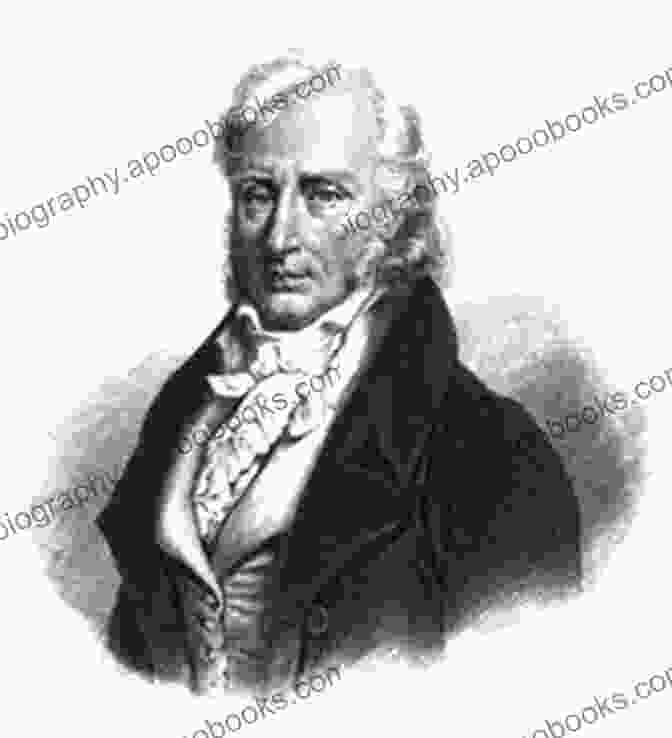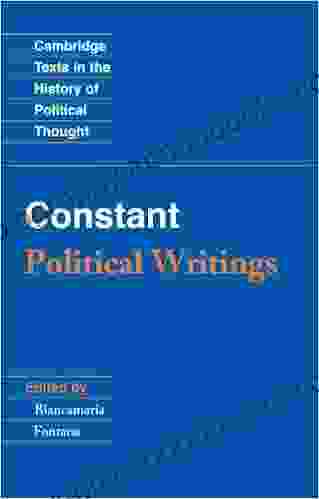Benjamin Constant: Political Writings - A Glimpse into the Mind of a Liberal

Benjamin Constant de Rebecque (1767-1830) was a Swiss-French political philosopher and writer who emerged as one of the most influential thinkers of the Enlightenment. His profound writings on politics, liberty, and individual rights continue to resonate deeply in contemporary political thought.
4.8 out of 5
| Language | : | English |
| File size | : | 4675 KB |
| Text-to-Speech | : | Enabled |
| Screen Reader | : | Supported |
| Print length | : | 366 pages |
| Lending | : | Enabled |
Born in Lausanne, Switzerland, Constant witnessed firsthand the tumultuous events of the French Revolution and the rise of Napoleon Bonaparte. These experiences profoundly shaped his political philosophy, leading him to champion the ideals of individual liberty, constitutionalism, and representative government.
Constant's political writings, spanning several decades, provide invaluable insights into his liberal beliefs. His seminal works, including "On the Spirit of Conquest and Usurpation" (1814),"Principles of Politics" (1815),and "Course in Constitutional Politics" (1818-1820),offer a comprehensive exposition of his political philosophy.
On the Spirit of Conquest and Usurpation

In his influential treatise "On the Spirit of Conquest and Usurpation," published in 1814 after the fall of Napoleon, Constant vehemently denounced the dangers of tyranny and military aggression. He argued that the thirst for conquest and the abuse of power inevitably lead to the erosion of individual rights and the suppression of liberty.
Constant asserted that true freedom can only flourish in societies where individual rights are protected by law and where the government is limited by a constitution. He believed that the military should be subservient to civilian authority and that the people should have a voice in their own governance.
Principles of Politics

Published in 1815, "Principles of Politics" is considered Constant's magnum opus on political theory. In this extensive work, he expounded on his core beliefs regarding the nature of government, the importance of individual liberty, and the role of citizens in a free society.
Constant argued that the primary function of government is to protect individual rights, particularly the rights to property, security, and free expression. He believed that governments should be established with the consent of the governed and should be subject to the rule of law.
Constant also emphasized the importance of a balance of powers within government. He advocated for a separation of powers between the executive, legislative, and judicial branches to prevent any one branch from becoming too powerful.
Course in Constitutional Politics

In his "Course in Constitutional Politics," delivered as a series of lectures in 1818-1820, Constant delved into the practical aspects of constitutional government. He examined the different models of constitutional systems, including monarchies, republics, and constitutional monarchies.
Constant believed that a well-designed constitution should establish clear limits on government authority, protect the rights of minorities, and provide for regular elections and a representative assembly. He also emphasized the importance of a free press and the right to petition the government.
Constant's "Course in Constitutional Politics" became a highly influential text for constitutional reformers throughout Europe and beyond. It played a significant role in shaping the development of modern constitutionalism and democratic institutions.
Legacy and Influence
Benjamin Constant's political writings remain essential reading for anyone interested in liberalism, individual rights, and constitutional government. His ideas continue to inspire and inform political thought and practice to this day.
Constant's advocacy for individual liberty and limited government has made him a revered figure in the annals of political philosophy. His writings have influenced generations of thinkers, including Alexis de Tocqueville, John Stuart Mill, and Karl Popper.
In an era marked by rising authoritarianism and threats to democracy, Constant's political writings serve as a reminder of the importance of safeguarding individual rights, protecting free speech, and ensuring the rule of law. His legacy endures as a beacon of liberalism and a testament to the power of human reason in shaping a more just and equitable world.
Benjamin Constant's political writings offer a profound exploration of the principles of liberty, constitutionalism, and representative government. His insights into the nature of power, the rights of individuals, and the role of citizens in a free society remain highly relevant in the 21st century.
Whether you are a student of political science, a historian, or simply an individual seeking to understand the foundations of modern democracy, I highly recommend delving into the works of Benjamin Constant. His writings will challenge your thinking, inspire your imagination, and provide you with invaluable tools for understanding the complexities of political life.
By embracing the ideas of this great liberal thinker, we can continue to strive for a world where individual liberty, human rights, and democratic values prevail.
4.8 out of 5
| Language | : | English |
| File size | : | 4675 KB |
| Text-to-Speech | : | Enabled |
| Screen Reader | : | Supported |
| Print length | : | 366 pages |
| Lending | : | Enabled |
Do you want to contribute by writing guest posts on this blog?
Please contact us and send us a resume of previous articles that you have written.
 Book
Book Novel
Novel Page
Page Chapter
Chapter Text
Text Story
Story Genre
Genre Reader
Reader Library
Library Paperback
Paperback E-book
E-book Magazine
Magazine Newspaper
Newspaper Paragraph
Paragraph Sentence
Sentence Bookmark
Bookmark Shelf
Shelf Glossary
Glossary Bibliography
Bibliography Foreword
Foreword Preface
Preface Synopsis
Synopsis Annotation
Annotation Footnote
Footnote Manuscript
Manuscript Scroll
Scroll Codex
Codex Tome
Tome Bestseller
Bestseller Classics
Classics Library card
Library card Narrative
Narrative Biography
Biography Autobiography
Autobiography Memoir
Memoir Reference
Reference Encyclopedia
Encyclopedia Ronnie Yimsut
Ronnie Yimsut Steffen Emmert
Steffen Emmert Anne Herries
Anne Herries Heather Inwood
Heather Inwood Matthew Ismail
Matthew Ismail David Stott
David Stott Alexandra Ripley
Alexandra Ripley Harry Owen
Harry Owen Courtney Peppernell
Courtney Peppernell Kandace Blevin
Kandace Blevin Ali Colleen Neff
Ali Colleen Neff Chris Carlson
Chris Carlson Alexander Mccall Smith
Alexander Mccall Smith Danny Katch
Danny Katch Robert E Looney
Robert E Looney Sonja Hollins Alexander
Sonja Hollins Alexander Karen Anna Vogel
Karen Anna Vogel Christine Warren
Christine Warren Fabrizio Maccaglia
Fabrizio Maccaglia Alexander Grey
Alexander Grey
Light bulbAdvertise smarter! Our strategic ad space ensures maximum exposure. Reserve your spot today!

 Italo CalvinoUnravel the Enigmatic Backwater Pass: A Thrilling Literary Journey with Kurt...
Italo CalvinoUnravel the Enigmatic Backwater Pass: A Thrilling Literary Journey with Kurt...
 Bryan GrayUnveiling the Enigmatic World of Anaxilea Gladiatrix: The Amazon Gladiator of...
Bryan GrayUnveiling the Enigmatic World of Anaxilea Gladiatrix: The Amazon Gladiator of... Leo TolstoyFollow ·9.9k
Leo TolstoyFollow ·9.9k Jules VerneFollow ·18.1k
Jules VerneFollow ·18.1k Neil ParkerFollow ·3.6k
Neil ParkerFollow ·3.6k Patrick HayesFollow ·3.3k
Patrick HayesFollow ·3.3k Jared NelsonFollow ·6k
Jared NelsonFollow ·6k Ernesto SabatoFollow ·4.9k
Ernesto SabatoFollow ·4.9k Herbert CoxFollow ·17.9k
Herbert CoxFollow ·17.9k Jarrett BlairFollow ·9.4k
Jarrett BlairFollow ·9.4k

 Chuck Mitchell
Chuck MitchellUnveiling the Enchanting World of Ernesto Nazareth's...
A Musical Journey...

 Brent Foster
Brent FosterSusan Boyle: Dreams Can Come True
Susan Boyle's incredible journey from...

 Tom Clancy
Tom ClancyThe Movement and the Myth Provocations: Unveiling the...
In the realm of human...

 Edward Reed
Edward ReedUncle John's Bathroom Reader Plunges Into Texas: Bigger...
Uncle John's Bathroom...

 Justin Bell
Justin BellNew Perspectives on Virtual and Augmented Reality: A...
Dive into the Cutting-Edge World of...
4.8 out of 5
| Language | : | English |
| File size | : | 4675 KB |
| Text-to-Speech | : | Enabled |
| Screen Reader | : | Supported |
| Print length | : | 366 pages |
| Lending | : | Enabled |










